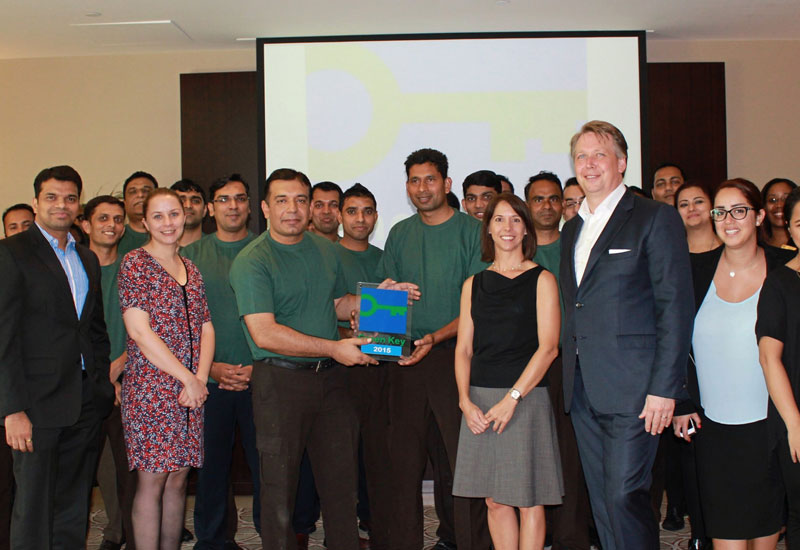 Fairmont The Palm received the 'Green Key' certification, awarded by EmiratesGBC for sustainable best practice in hotels
Fairmont The Palm received the 'Green Key' certification, awarded by EmiratesGBC for sustainable best practice in hotels
The hospitality sector in the UAE has begun playing its part in meeting strict green regulations. Fairmont The Palm was the first hotel on Dubai’s man-made island to successfully meet the stringent norms of qualifying for the ‘Green Key’.
The Green Key is a sustainability certification programme for hotels and resorts that was developed by the Foundation for Environmental Education. Recognised by the World Tourism Organisation and United Nations Environment Programme (UNEP). Emirates Green Building Council (EmiratesGBC) has been the national operator of Green Key in the UAE since May 2013.
The rationale and objective
Fairmont The Palm is one of the early adopters of sustainable practices, according to Mark Sawkins, GM, Fairmont The Palm. The luxury hotel has expanded this commitment to include economic, environmental, and social programming through its Fairmont Sustainability Partnership. As part of a global hospitality brand that supports sustainability and environment initiatives in its properties around the world, Fairmont The Palm initiated and followed a number of environmentally friendly practices and sustainable methods since its opening in December 2012.

| Advertisement |
The concept and investment
To achieve the Green Key Certification, the hotel was required to fulfil 100 international criteria related to environmental management, staff involvement, guest information, water conservation practices, washing and cleaning methods, waste management (reduction and recycling waste), energy conservation practices, food and beverage quality, landscaping activities and social activities, which are to be revised every three years.
A complete plan was set in place, covering all hotel-related areas including the operations, the employees as well as the hotel guests through a number of sustainable initiatives, where they were encouraged to particiapte.
“First a sustainable committee was formed and employees from all departments were encouraged to take part to share ideas, promote environment related initiatives and support the hotel in its different CSR related activities. We then identified the environmental objectives and an action plan for the hotel operation was created,” reveals Sawkins.
Work was put into raising the employees’ and guests’ awareness towards environmental issues and ongoing green practices in the hotel. In addition to this, energy saving initiatives and capital investment in LED lights and water saving aerators were implemented.
The hotel also appointed a professional energy consultant to conduct a hotel energy audit and identify potential areas for further energy saving. The property also invited long-stay guests to participate in the process by opting not to have their linen and towels changed on a daily basis.
The programme in practice
This milestone was achieved by a number of recycling programmes and energy saving practices that included installing LED lights in public areas, and installing water flow reducers in all guest bathrooms. The number of light fittings in the car park were reduced significantly, and timer activated decorative lights in the guest floor corridors were deployed. These methods offered innovative ‘green’ alternatives to guests without compromising on the quality and standards of the Fairmont brand.
The engineering team, led by the winner of the 2014 Hotelier Middle East Engineer of the Year Sushant Pawar, worked on waste management. Pawar and his team of engineers reduced waste and identified other eco-friendly opportunities. Recycling bins were placed throughout the resort and approximately 12,500kgs of waste paper, plastic, cans and bottles were collected along with 7,000 litres of cooking oil for the second half of 2014. Food scraps were diverted to a compost, which served as fertiliser for an in-house chef’s garden.
Various steps were taken to conserve water across the length and breadth of the property. Several sensors were installed on balcony doors in the guest rooms, which automatically switches off the air conditioning system when the balcony doors are opened.
Since hotels require constant maintenance in order to be keep up to its reputation, the engineering team devised a preventive planned-maintenance checklist that has now become a standard operating procedure. The system is in use across front office and housekeeping departments at the hotel to identify and report flaws as found in the guestrooms on a daily basis.
The results to date
Based on the various sustainable and environment friendly initiatives, the hotel has managed to raise the waste diversion rate from 3% in 2014 to 4.5% in 2015. Water conservation was up by 10% in 2015 compared to 7.4% in 2014. Furthermore, by monitoring hotel operations and energy consumption patterns since pre-opening and implementing energy saving practices from 2013 to 2014, energy reduction was reduced by 30% (worth AED 1,000,000 per year when compared to the budget without any further capital investment) and translated to waste reduction of 10% from the hotel.








 Search our database of more than 2,700 industry companies
Search our database of more than 2,700 industry companies









